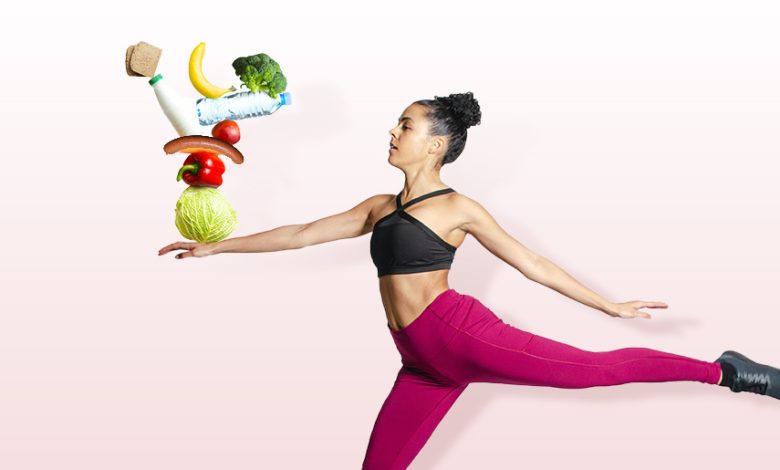What is the key to a balanced meal?

We all are aware of the concept of a good diet, a balanced diet. It is not recently that the term evolved, but for many years, our ancestors had been trying to befriend this healthy way of living. Their definition of a balanced diet has undoubtedly benefited them in such a way that the majority of them, as we look around, are still mentally and physically fit.
In fact, in today’s generation, youngsters have been showing some serious careless attitude towards a balanced diet. They crave unhealthy food and then, they run to the escapism of obesity, i.e. hit the gyms. Well honestly, this is not how you can maintain your body.
A Pathway to Healthy Body
This will help you stay in proper shape, but the necessary nutrients that your body requires, will not get their place. If you are over-cautious about your diet and merely have salads and juices for the whole day, then this is for you all too. Our body does end up shrinking at an unbelievably faster rate and it eventually helps us attain our “dream figure”, but please take a simple note that “All nutrients must get fairly distributed in your body”. With this, let us take you along the informative and beautiful journey of a balanced diet/balanced meal.
A healthy meal is a total of a diet that covers these core food groups. These are Protein, Carbohydrates, Vitamins, Minerals, Fats and Water. Out of these, Carbohydrates, Proteins and Fats are macronutrients that are required in large amounts since they provide the body with energy in kilocalories. Vitamins and Minerals on the other hand are micronutrients and they are required just in small yet significant amounts.
Therefore, in some way or the other, these nutrients are required to give our body the necessary energy, growth and healthy metabolic functioning. With HaveRaw, let’s go through a detailed study of each of these food groups so that you can embrace your faithful start towards “an actually balanced meal”. (Their benefits, Their advantages to the body etc.)
One-Quarter of Carbohydrates:
A balanced amount of carbohydrates is required by our body to provide the required energy to the brain, muscles and other body organs. It is included in foods such as pasta, rice, potatoes, bread, oats etc. With these foods, your body fibre and Vitamin B rate will also increase. This will help in proper energy utilisation and bowel movements. So in other words, the more active you are, the more carbohydrates your body needs.
One-Quarter of Proteins:
This group helps in regulating and maintaining your muscle tissue, hormones, blood cells and enzyme production. A sedentary adult should have an intake of about 0.8 grams of protein per kilogramme of body weight, or 0.36 grams each pound, according to the Dietary Reference Intake report for macronutrients. That means a sedentary male should consume 56 grams of protein per day, while a sedentary female should consume 46 grams.
This should include foods like seafood, milk, pulses, yoghurt, cheese, tofu etc. If you are a vegan or vegetarian, do not limit yourself to just 1 or 2 items from this list. Do your research, make a healthy-green chart and thrive through your well-being.
One-half Vitamins and Minerals:
If the number of vitamins and minerals are present in adequate amounts in your body, then your metabolism rate will also be flawless and all the organs will work efficiently. They help in repairing damaged tissues and also act as antioxidants. Fresh fruits and vegetables are the best way to keep these maintained. Hence, there is no such thing as too many fruits or vegetables for your body.
One-Quarter Calcium:
If you want to run, walk and jump at ease for a longer period of your life, then you should seriously consider getting a lot of calcium essentials for your body. Your bone and muscle health will be boosted by foods such as tofu, soya-bean products, broccoli, almonds etc.
High-fibre foods, depending on age and sex:
These are an important part of a healthy weight-loss diet, and getting the necessary daily fibre consumption can have several health benefits. According to experts, the following approximate daily intake is recommended:
Daily Intake Requirement (Adult Men/ Women)
Adult men require approximately 34 g of fibre depending on their age, whereas adult women require approximately 28 g of fibre depending on their age.
Fibre intake is adjusted for specific groups based on their energy needs at various periods of life.
Brief Guide to Balanced Meal
The idea to talk about a balanced meal is to not split up things. It is like a basic guide to direct you on the items, proportions and long term benefits of the same. It doesn’t mean that you force yourself to have just the right amount of each of these groups every day. (One quarter/ one half).
Someday, if you happen to consume anything more or less, then you can always balance it over the week. This includes dishes like Banana Almond Oatmeal, Veggie Omelette, Cheese Omelette, Chickpea Buddha Bowl, Pesto Rice and Broccoli etc.
Processed foods, such as chocolate, cake, chips, and biscuits, can be included in a healthy and balanced diet as well, but only in moderation. The important thing to remember is that they all belong to the same food group, regardless of what we label it: treats, junk food, unhealthy food, snacks, and so on. Eating a variety of ‘treats’ still equates to a large number of treats which is super unhealthy.
Just restrict yourself from having foods with too much cholesterol, fats and sugar like Pizza, Chocolates, Chips etc. They are addictive and can help your stomach fill unnecessarily. We are forced to ignore a nutritious and balanced meal or consume unnecessary kilocalories if we eat more of this type of food.
To have a more detailed idea, here are some more tips for healthy eating and lifestyle in the form of FAQs:
1) What should be included in a balanced meal?
A balanced meal should consist more of fruits, vegetables, protein and dairy products.
2) What 5 things should a well-balanced meal consist of?
Carbohydrates
fruits and vegetables
Protein
Dairy
Healthy fats
These 5 are all good sources of energy that our body needs to function properly.
3) What is the importance of a balanced diet?
It helps the body to be disease-free, have the best growth, and maintain weight well.
4) How do I make a healthy meal plan?
- Don’t skip breakfast. Breakfast will provide you with a boost of energy to start your day.
- Keep your mid-morning snack optional
- Have soup, fresh veggie salad or sandwiches for lunch
- Keep your mid-afternoon snack optional as well
- Don’t overeat during dinner. Avoid heavy, sugary and greasy foods before going to sleep
Lastly, at HaveRaw, we’ll just say that don’t be disheartened if you don’t follow the plan precisely as written. It’s acceptable to make changes to meet your lifestyle and needs. Simply make an effort to include healthy foods in your daily routine —vegetables, fruit, proteins, beans and legumes, and whole grains are all good choices. Have a healthy life ahead!





